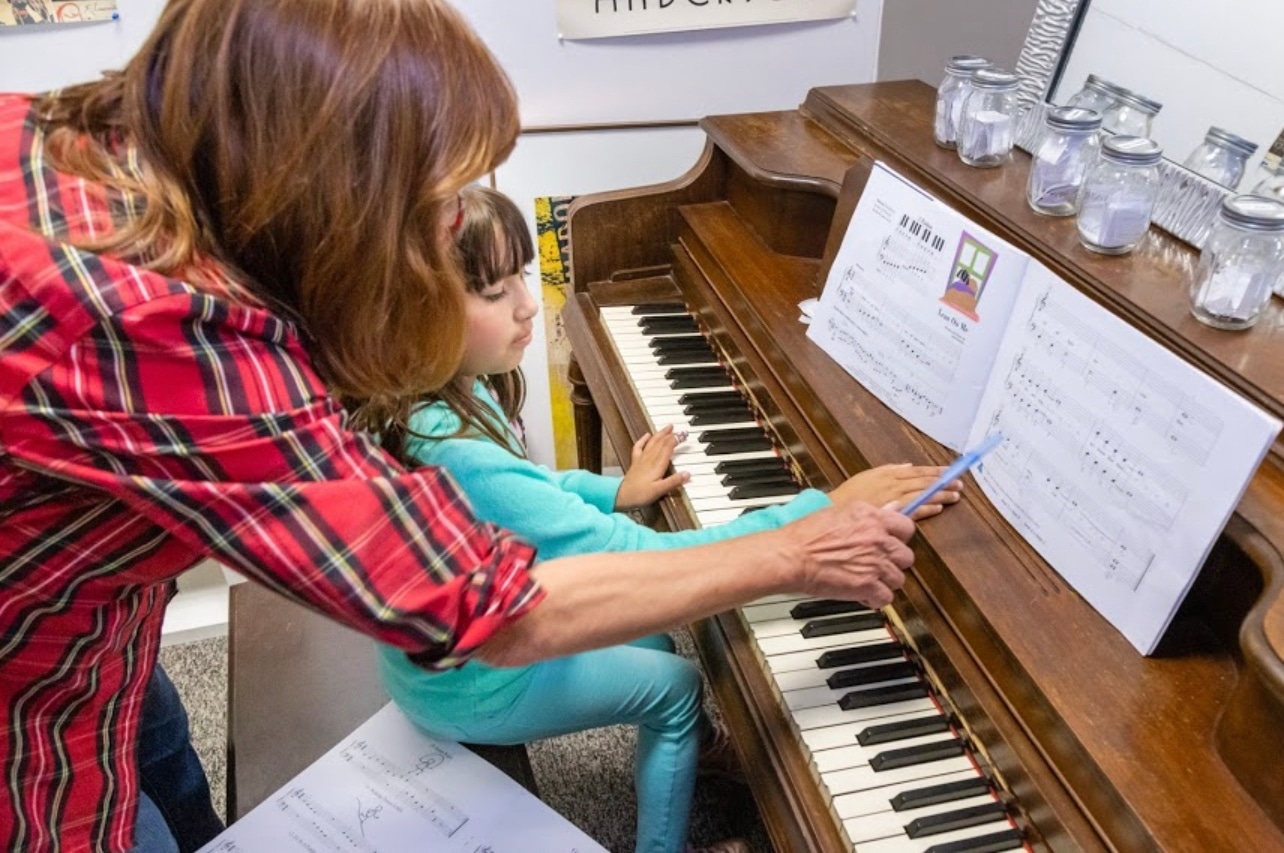
As a parent of four kids I know how important it is to encourage your children to pursue their passions, and I also know that some of these activities can be expensive! As a performing arts studio owner, one of the most frequent questions I get asked is why are music lessons so expensive. In this blog, we will explore the various factors contributing to the expense of music education, shedding light on the intricate web of elements that make up the price tag attached to those invaluable lessons. These factors include highly skilled instructors, individualized attention, quality instruments and equipment, time and preparation, self employment, licensing and certification, and administrative and overhead costs.
Highly Skilled Instructors
One of the main reasons behind the high cost of music lessons is the expertise of the instructors. Music teachers often hold advanced degrees in their respective fields, showcasing not only their passion for music but also their commitment to honing their craft. Achieving mastery in a musical instrument or vocal technique demands years of dedicated practice and study, and instructors who have reached this level of proficiency understandably command higher compensation for their specialized skills.
In addition, music teachers typically continue their education throughout their careers, attending workshops, conferences, and seminars to stay updated on the latest teaching methods and musical trends. This continuous pursuit of excellence ensures that students receive the most comprehensive and up-to-date education, but it also contributes to the overall cost of music lessons.
Individualized Attention
Unlike some other forms of education, music lessons typically involve one-on-one instruction. This personalized approach allows the teacher to tailor their guidance to the student’s specific needs, abilities, and learning style. While group lessons may be more cost-effective, the benefits of individualized attention are substantial.
In a private lesson setting, the instructor can address the unique challenges and strengths of each student, offering targeted feedback and guidance. This level of personalization accelerates the learning process, making it more efficient and enjoyable. However, the cost associated with providing this individualized attention, in terms of the teacher’s time and expertise, contributes to the overall expense of music education.
Quality Instruments and Equipment
The investment in quality instruments and their maintenance is another prominent reason why music lessons are so expensive. Learning to play a musical instrument requires access to high-quality instruments and equipment. From pianos to guitars and other instruments, the cost of these tools can be significant. Music schools and instructors often invest in top-notch instruments to provide students with the best possible learning experience.
In addition to the instruments themselves, the upkeep and maintenance of these tools require both time and financial resources. Regular tuning, repairs, and replacements are essential to ensure that students have access to instruments that produce optimal sound quality.
Time and Preparation
Effective music instruction extends beyond the actual lesson time. Instructors spend considerable time planning and preparing for each lesson, tailoring their approach to the student’s progress and goals. This preparation involves selecting appropriate repertoire, creating customized exercises, and developing strategies to address specific challenges.
Instructors also often invest time in staying informed about the latest educational methodologies and integrating innovative teaching techniques into their lessons. This commitment to continuous improvement requires additional training costs, but it ultimately enhances the quality of education provided to students. The investment of time and effort by music instructors contributes to the overall cost of music lessons.
Self Employment
Another significant aspect influencing the cost of music lessons is the self-employment status of many music teachers. A substantial portion of music instructors operate as independent professionals, managing their own businesses and shouldering the responsibilities that come with self-employment. Unlike educators in traditional school settings, self-employed music teachers need to handle tasks such as marketing their services, managing schedules, handling billing and taxes, and maintaining a client base.
These entrepreneurial responsibilities add an additional layer of complexity to their work and require a commitment of time and resources beyond actual teaching hours. The autonomy that comes with self-employment allows music teachers to tailor their offerings and focus on individual student needs, but it also means taking on the financial and administrative burdens of running a small business. The costs associated with self-employment, including marketing efforts, business insurance, and other business-related expenses, contribute to the overall pricing structure of music lessons.
Licensing and Certification
Licensing and certification also contribute significantly to the cost of music lessons. Many reputable music instructors hold certifications from recognized music education institutions or accrediting bodies. These certifications not only validate the instructor’s proficiency in their chosen instrument or vocal technique but also demonstrate their commitment to meeting professional standards. Acquiring and maintaining these certifications often involves undergoing rigorous training, attending specialized workshops, and fulfilling ongoing professional development requirements. The costs associated with obtaining and renewing certifications, coupled with the time and effort invested in meeting the necessary criteria, contribute to the overall expense of music lessons. However, these certifications play a crucial role in ensuring that students receive instruction from qualified and competent instructors, further enhancing the quality and credibility of music education programs.
Administrative Costs and Overhead
Another contributing factor as to why music lessons are so expensive are the various administrative costs and overhead expenses. Music schools, private instructors, and studios need to cover rent, utilities, insurance, and other operational expenses. Additionally, administrative studio staff play a crucial role in managing schedules, handling inquiries, and coordinating various aspects of the music education program.
These administrative functions are essential for the smooth operation of music schools and private studios, but they contribute to the overall cost of music lessons. While they may not be directly related to the instructional aspect, these behind-the-scenes activities are integral to providing a well-organized and efficient learning environment.
Other Variables
The cost of music lessons is further influenced by several variables. Firstly, the length of the lessons plays a significant role in determining overall costs. Longer sessions typically come with a higher price tag, reflecting the additional time and expertise provided by the instructor. Student experience level is a crucial variable and tailoring lessons to individual skill levels adds complexity to the teaching process, influencing the overall cost. The choice between online and in-person lessons also affects pricing. Online lessons offer flexibility and convenience but may have associated costs related to technology and software. In contrast, in-person lessons may involve travel expenses and potentially higher overhead for instructors with dedicated studio spaces. The ability to customize lessons based on these variables allows for a more tailored and personalized learning experience but contributes to the intricacies of pricing in the realm of music education.
2023 Average Prices for Music Lessons in the Seattle/Snoqualmie Area
|
Lesson Length |
Low-Level Cost |
Average Cost |
Top-Level Cost |
|
30 minute lesson |
$30.00 |
$40.00 |
$55.00 |
|
60 minute lesson |
$60.00 |
$80.00 |
$100.00 |
While the cost of music lessons may initially seem high, rather than viewing the expense as a barrier, it’s crucial to recognize the value that music education brings to individuals and communities. The benefits of learning to play a musical instrument extend far beyond the classroom, impacting cognitive abilities, emotional well-being, and social skills. By appreciating the dedication and resources invested in music education, we can better understand and support the true worth of these invaluable lessons.
If you are in the Seattle/Snoqualmie area and looking for quality private music instructions, check out the offerings we have at Big Star Studios. We offer lessons in voice, piano, guitar, drums and ukulele as well as theatre classes. We pride ourselves on having exceptionally skilled instructors and strive to keep our costs affordable in order to reach as many students as possible. Our mission is to guide students in nurturing both their music skills and invaluable life skills that build confident, empathetic, and reflective young individuals through the transformative power of the performing arts.
If you have any questions or interest in any of the classes we offer at Big Star Performing Arts please reach out to me! I am available by phone or email anytime.
Author:
Corey Schwarz
Executive Director, Big Star Performing Arts Studio
425-292-3342
corey@bigstarstudios.com


